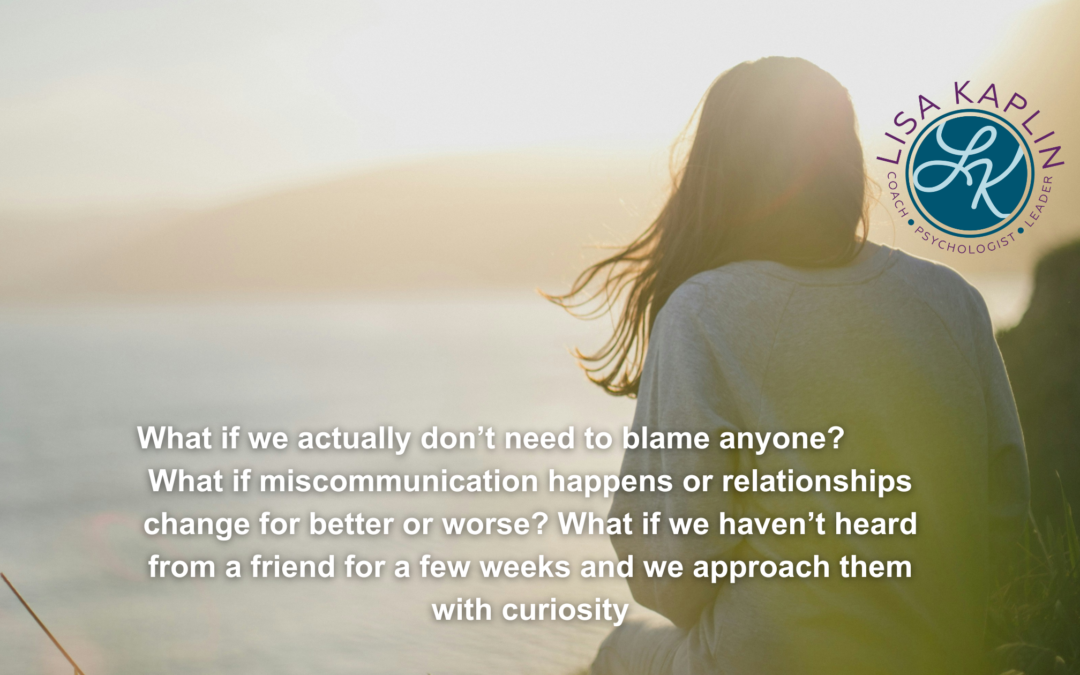How often have you not heard back from a friend or a colleague and you’ve asked
yourself, “What have I done wrong?” Or maybe you’ve said, “This is what they’ve done
wrong.” Either way, often our first thoughts are to place blame, either on ourselves or
the other person. Although this is a relatively normal initial thought, it’s certainly not a
helpful one in the long run.
When we haven’t heard from someone or we’ve gotten a one word response
from them and we go right to, “What did I do wrong?” we are starting out on the
defensive or from a victim point of view. “Why are they mad at me? What did I say
wrong? Was it that one time that I told them I didn’t like something about them?” We are
looking to blame ourselves in a way that isn’t open to feedback and is rather filled with
remorse, judgment, and probably shame. If we approach the other person from those
feelings, how well is that conversation going to go?
If we approach them from a “You did something wrong” point of view, we are
coming at the situation in attack mode and also with judgment of the other
person. We are angry, frustrated, and ready to go on the attack. What could possibly go
wrong? As you can imagine, quite a bit. When we approach someone from attack
mode, it’s unlikely that we will have a healthy, beneficial conversation.
So, if we are not going to blame ourselves and we are not going to blame the other
person, who can we blame? What if we actually don’t need to blame anyone? What if
miscommunication happens or relationships change for better or worse? What if we
haven’t heard from a friend for a few weeks and we approach them with curiosity, with a
“What’s up?” point of view versus a “What’s wrong with one of us?” viewpoint?
Approaching any conversation, even conflict, from a curious frame of mind means we
are open to learning more about the other person’s perspective. In learning more about
what is going on with them, we can then decide how we want to approach the situation.
It’s possible that they are unhappy with you and if so, now you’ll know. Maybe what- is
going on with them has absolutely nothing to do with you.
Maybe they want to end a friendship or a professional relationship. Although that
might be really painful, it’s at least the truth and the reality of the situation. Even if
something is painful, we can handle it and ultimately move on. Curiosity is
much more likely to lead to a healthy, open conversation that is focused on problem
solving versus blaming. Next time you start to ask yourself, “Who’s fault is this?” instead
consider asking yourself, “What’s really going on here?” Let me know how you do.
Love,

Certified Professional Coach and Psychologist
____________________________________________________________________________________________________________________________________________________________________
How often have you wished for that person in your life who listens deeply, doesn’t judge you, and doesn’t try to fix you? That person who holds space for you to talk through your struggles, your hopes, and dreams so that you can live the personal and professional life that you truly want? I’m that person. Yes, I’m a psychologist and a professional life and leadership coach but my superpower is listening, deep, empathic, compassionate listening. If you’ve been seeking a professional listener who will help you live the life you truly desire, let’s set up a time to talk. My email is Lisa@LisaKaplin.com.

